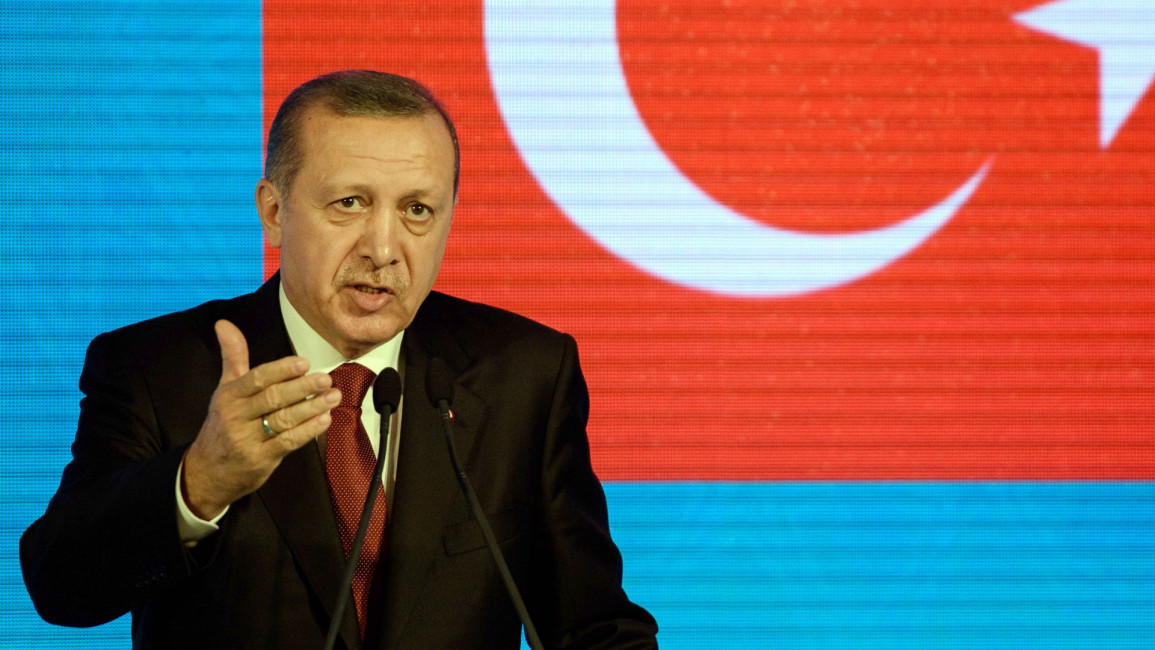Turkey could close border with Iraqi Kurds ‘any moment’
Turkey’s president says the country could close its border with Iraq’s semi-autonomous Kurdish region “at any moment” as a further reprisal for it holding a non-binding referendum on independence last month.
Recep Tayyip Erdogan’s comments were reported in Hurriyet newspaper on Thursday, and come days after Ankara closed its airspace to flights to and from the Iraqi Kurdish region. Turkish airline companies have also suspended flights to Iraqi Kurdish cities.
Erdogan said: “We have not closed our border gates yet, but this can happen at any moment.”
Turkey said on Wednesday that Iraq’s retaking of the northern city of Kirkuk from Kurdish forces earlier this week has rectified the Kurds’ “mistake” in holding a non-binding referendum on independence last month.
Turkey has close ties to the leadership of Iraq’s autonomous Kurdish region, but had urged them not to hold the vote. Iraq’s central government and neighboring Iran were also deeply opposed to the referendum, in which more than 90 percent voted for independence.
Iraqi Kurdish leaders “miscalculated and didn’t listen to our recommendations,” Foreign Minister Mevlut Cavusoglu said during a news conference in Ankara with his Portuguese counterpart.
“They thought they would make further gains — they didn’t. They thought they would unite the Kurds. On the contrary it has unfortunately divided Kurds in Iraq. There is huge chaos and confusion.”
The referendum has put Iraqi Kurdish President Masoud Barzani in a delicate position as he now faces questions over whether the vote was worth the consequences — losing the oil-rich Kirkuk region and other territories to federal authorities.
Kurdish officials said on Wednesday that elections for Barzani’s post and the Kurdish parliament have been postponed. The regional electoral commission, citing the developments in Kirkuk, said the Iraqi Kurdish parliament would pick a new date. It also said there were not enough candidates to proceed with the polls, which were originally slated for Nov. 1.
Turkey, which is fighting a Kurdish insurgency within its borders, strongly opposes Kurdish moves toward independence in neighboring countries like Iraq that also have large Kurdish populations.
This week, it closed its airspace to flights to and from the Iraqi Kurdish region and said it would take steps to ensure that the control of a border gate into the region would return to the authority of Iraq’s central government.
Addressing a group of local administrators in Ankara, Turkish President Recep Tayyip Erdogan said he holds the leadership of the Iraqi Kurdish region responsible for the bloodshed that ensued in the wake of the referendum.
Scattered clashes broke out as federal forces pushed into Kirkuk on Monday, but most Kurdish forces pulled out without a fight. The multi-ethnic city is home to Kurds, Arabs, Christians and a Turkmen community with close historic and ethnic ties to Turkey.
“What right do you have to lay claim on Kirkuk?” Erdogan said. “What history do you have in Kirkuk? What business do you have in Kirkuk?”
He called on the Iraq’s Kurdish population to “punish” the leaders of their autonomous region.
Presidential spokesman Ibrahim Kalin said Turkey was engaged in “intense diplomacy” with Iraq’s central government to safeguard the rights of the Turkmen population in Kirkuk.
The UN Security Council expressed concern Wednesday over the reports of violence around Kirkuk. It urged the parties “to refrain from the threat and use of force, and to engage in constructive dialogue as a pathway to de-escalation and a means to preserve Iraqi unity while upholding the provisions of the Iraqi constitution.”
Council members reaffirmed support for Iraq’s sovereignty and territorial integrity and the importance of the country remaining focused on efforts to defeat the Islamic State extremist group. They also voiced “full support for UN efforts to facilitate dialogue between Iraqi stakeholders.”



